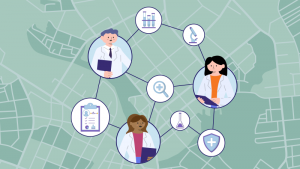Educator-to-Educator Tips & Strategies
Find out how your peers are making the most of Aquifer cases and teaching tools.
Find out how your peers are making the most of Aquifer cases and teaching tools.

By: Laurel Miller, PA-C | Assistant Professor – Directo … Read more

In our Longitudinal Integrated Clerkship, students transitioned patient-based clinical learning from real patient to Aquifer cases in late March. These more advanced level clerks required that virtual cases have increased complexity to adequately challenge them and continue building their clinical skills. In order to meet these learning demands, Aquifer cases were introduced as written and then modified in preceptor lead discussions to encourage further clinical reasoning skill development.

Our community faculty are busy clinicians in local health systems or private practice. At several points throughout the clerkship, we provide calendars with the didactic and Aquifer case schedule illustrating the clinical information students will cover on campus. We actively encourage preceptors to engage in discussion with their students about what was covered during these activities outside of their offices to the benefit of both students and preceptors.

Students provide consistently high rankings for Aquifer as reported in our five-star rating feedback data, but how and when cases are integrated into the curriculum can have a significant impact on their learning. Find out what themes emerged when we ask students what methods are most effective–and discover practical tips for assigning Aquifer cases based on student feedback.

We have integrated Aquifer Geriatrics cases in several different ways throughout our Geriatrics and Healthy Aging Curriculum thread. First-year students have a modified team-based learning session around the Dementia case. In the third year, cases prepare students for oral presentations on rounds…

Like many others, Boston University moved to a shortened virtual-only clerkship (packed with the full knowledge of our regular in-person 6-week clerkship, of course) in March of 2020. We were able to leverage Aquifer cases as a framework for preceptor discussion sessions and learning activities. The plan outlined below was for our 2-week virtual pediatrics clerkship, but I think the framework could apply to a variety of clerkships or courses transitioning to virtual group discussions.

Many educators are wondering how to meaningfully engage their students in distance learning activities that create community and allow them to practice important patient care skills (while not seeing patients). While I have been doing peer-to-peer consults with educators around the country about using Aquifer cases in their curriculum, I stumbled into a helpful reframe that seems to be unlocking people’s creativity: Aquifer cases (yep…more than 170 of them!) are virtual standardized patients. Wait…what?